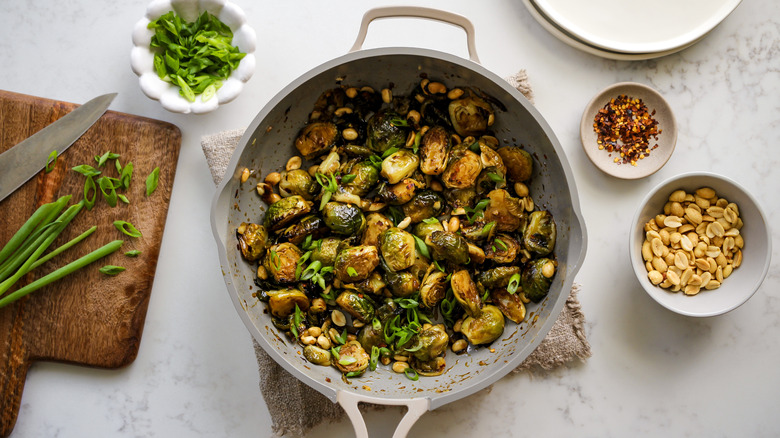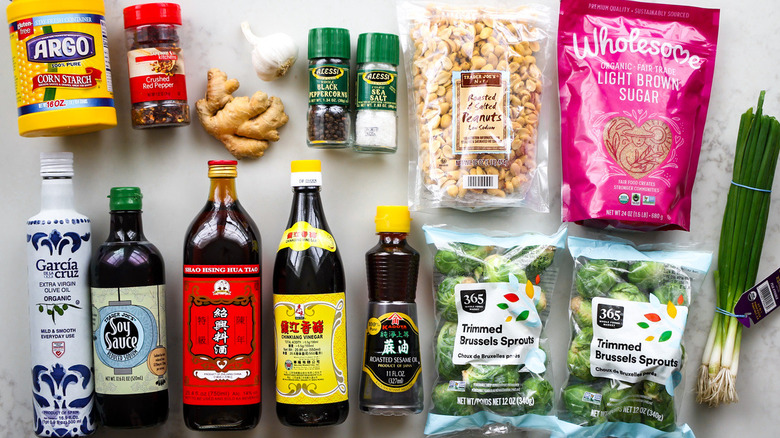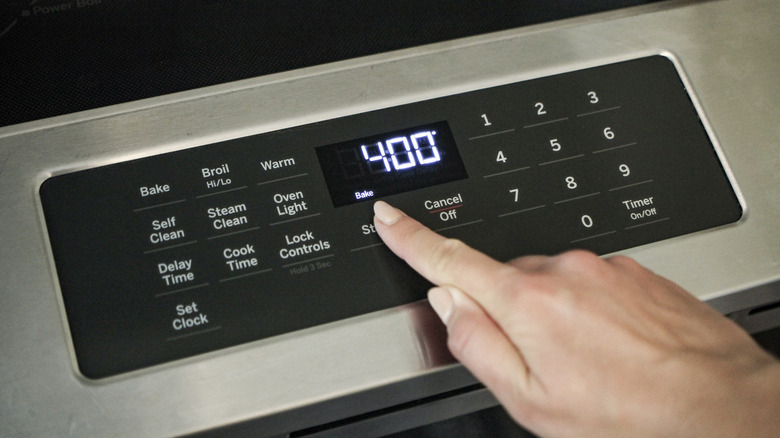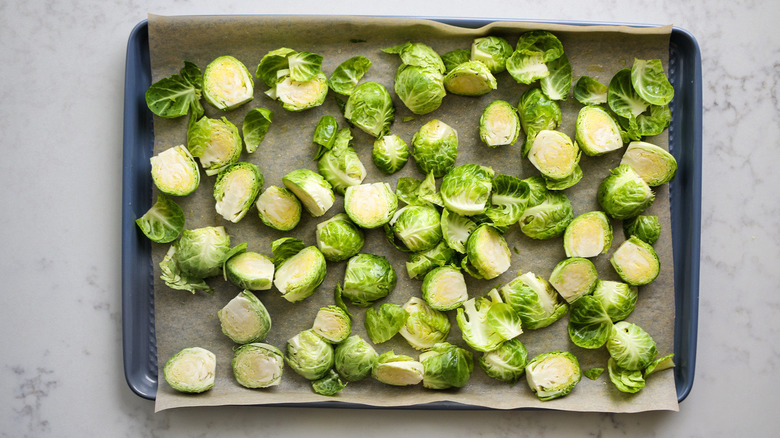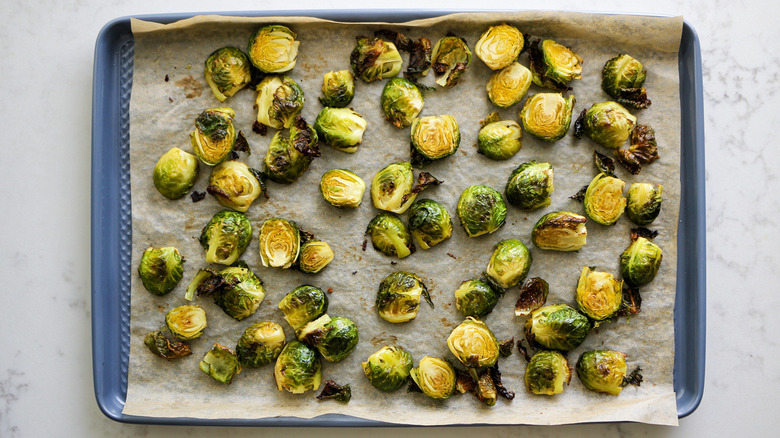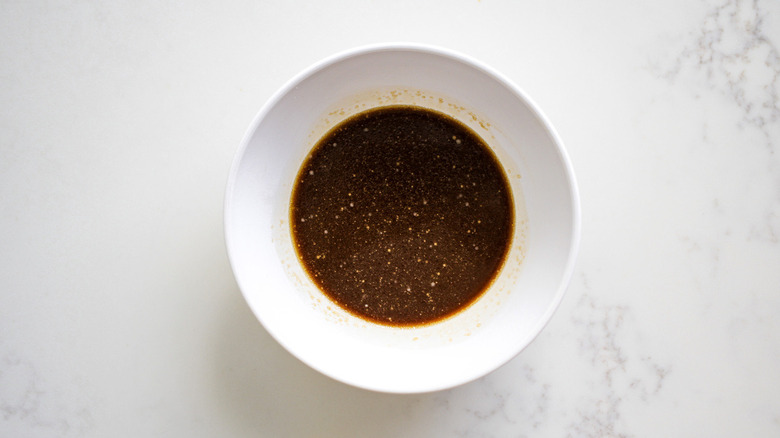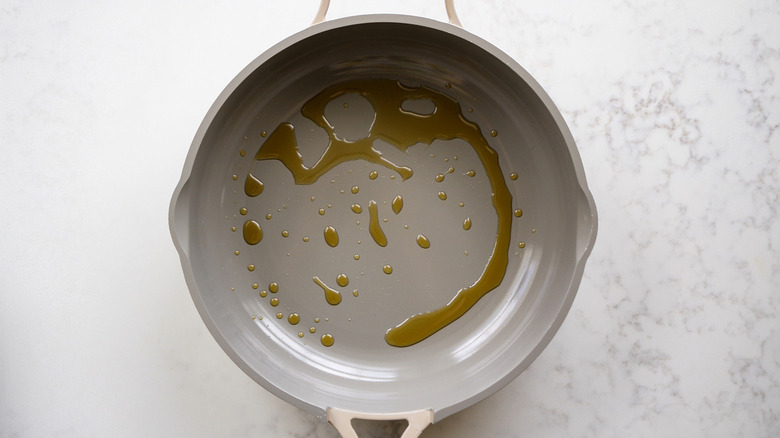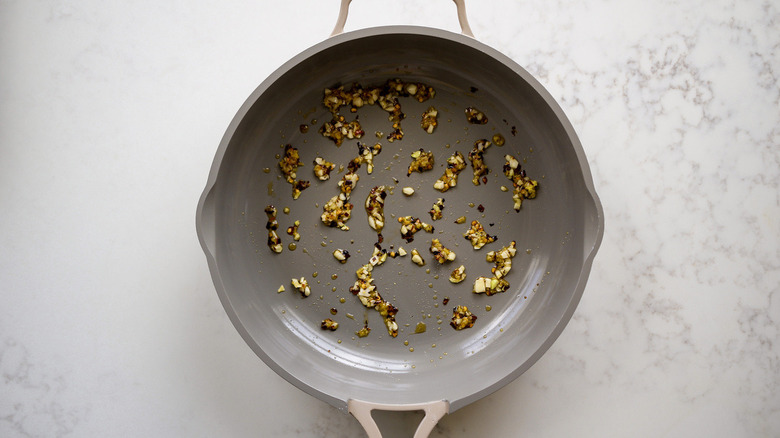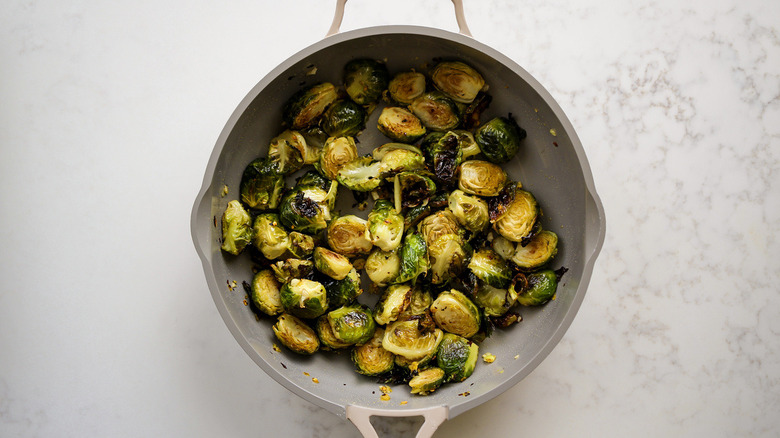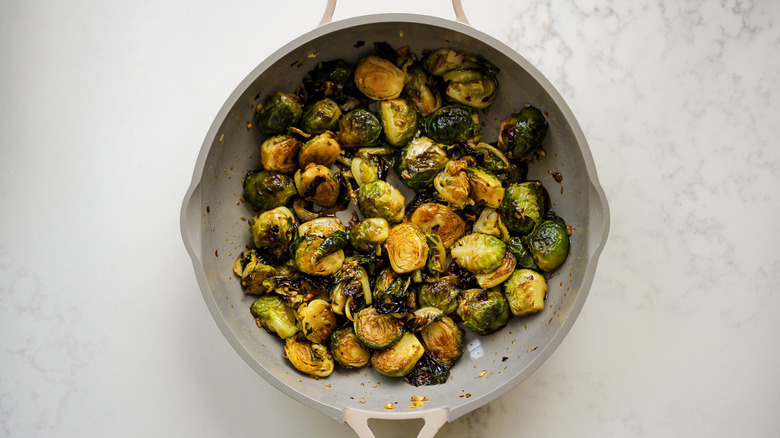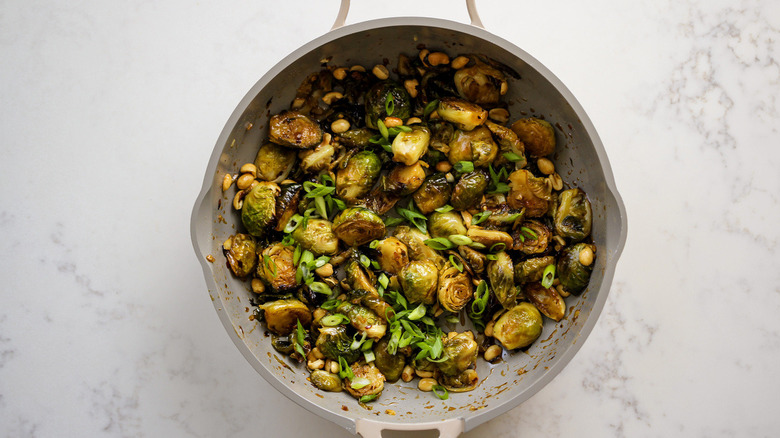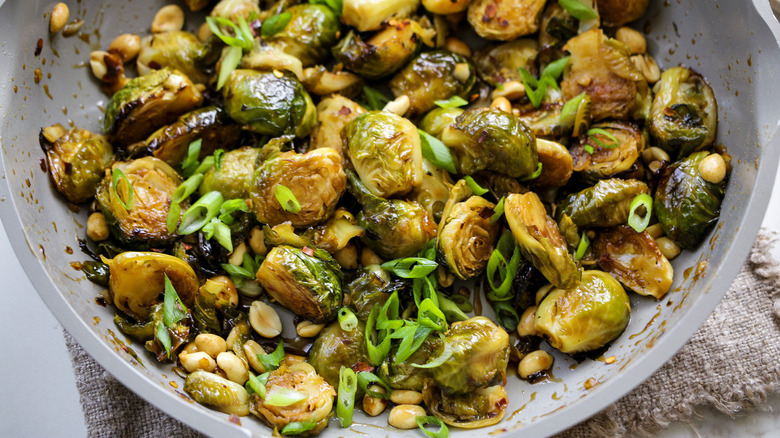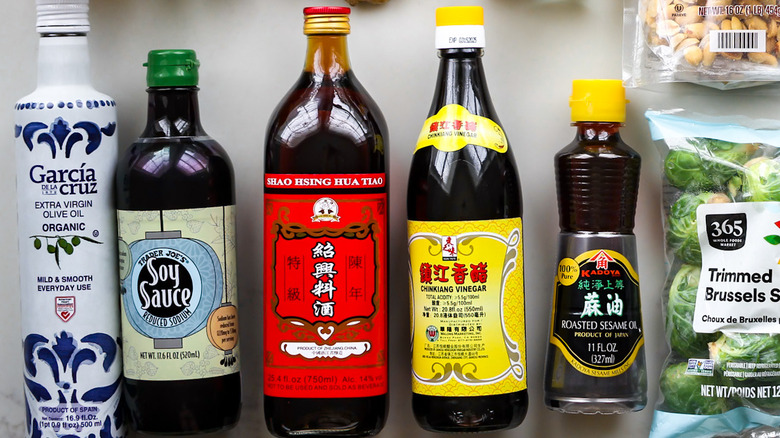Kung Pao Brussels Sprouts Recipe
Kung pao-style cooking may date back to the 19th century, but developer Feta Topalu gives her recipe a contemporary spin by replacing the chicken typical of the dish with recently trendy Brussels sprouts. The sprouts are first roasted in the oven and then finished on the stovetop with a zesty sauce that combines tangy, sweet, umami, and spicy flavors. Topalu notes that "Typically, kung pao dishes have a moderate level of spiciness," something that she achieves in her version through the use of crushed red pepper, although other kung pao recipes often call for whole dried chiles and Sichuan peppercorns. She tells us that you can adjust the heat level to your preference by using more or less red pepper, while you could also dial up the spice by adding Chinese chile peppers, chile paste, or cayenne.
This vegetable dish would make a nice light meal served over rice, but it would also be a great accompaniment to a Chinese-style entree. Some possible recipe pairings include sesame chicken, twice-cooked pork with cabbage, and slow-cooker Mongolian beef. If you want to keep things meat-free, you could also serve these Brussels sprouts alongside a vegan stir-fry like salt and pepper tofu.
Collect the ingredients for the kung pao Brussels sprouts
The dish starts with Brussels sprouts roasted in olive oil, then simmered in a coating of soy sauce, Chinkiang vinegar, Shaoxing wine, sesame oil, brown sugar, and cornstarch. Garlic, ginger, crushed red pepper, black pepper, and salt give the dish some additional flavor, as do the green onions and peanuts added at the end.
Step 1: Preheat the oven and prepare a pan
Preheat the oven to 400 F. Line a baking sheet with parchment paper.
Step 2: Drizzle the Brussels sprouts with oil
Place the Brussels sprouts onto the baking sheet and drizzle them with olive oil.
Step 3: Roast the Brussels sprouts
Roast in the oven for 20 minutes, flipping the Brussels sprouts half way through cooking time.
Step 4: Make the stir-fry sauce
In a bowl, whisk together the soy sauce, Chinkiang vinegar, Shaoxing wine, 1 teaspoon sesame oil, brown sugar, and cornstarch. Set aside.
Step 5: Warm the rest of the oil
Heat the remaining 3 teaspoons of sesame oil in a skillet over medium heat.
Step 6: Fry the garlic, ginger, and red pepper
Add the garlic, ginger, and chili flakes and saute for 2 minutes.
Step 7: Fry the Brussels sprouts
Add the roasted Brussels sprouts and stir-fry until coated. Reduce the heat to medium/low.
Step 8: Add the sauce
Pour the sauce over the Brussels sprouts and simmer for 2-3 minutes, or until the sauce is slightly thickened, stirring occasionally. Season with salt and pepper to taste.
Step 9: Serve the dish with peanuts and green onions
Remove the sprouts from the heat. Stir in the roasted peanuts and garnish with green onions before serving.
What other kinds of vegetables can I use for this recipe?
Brussels sprouts are what Topalu refers to as "the star of this dish." If you never managed to climb aboard the Brussels sprouts train, though, or you have heaps of other produce on hand, you can apply the same method of pre-roasting and stir-frying in kung pao sauce to other types of vegetables. Topalu suggests that the recipe will work with broccoli, cauliflower, green beans, or edamame, while root vegetables like carrots or potatoes can also be given the kung pao treatment. Oven time may vary depending on the vegetable, though, since green beans might be done in just 15 minutes while potatoes could take up to an hour.
You can also mix and match your vegetables to make a kung pao vegetable medley. Another idea is to add some protein, such as tofu or chicken strips, to the sheet pan as you're cooking the vegetables. This way, once you're done with the stir-frying, all you'll need to do is add rice or noodles to have a complete meal.
What can I use in place of Chinkiang vinegar and Shaoxing wine?
One of the ingredients called for in this recipe, Chinkiang vinegar, is usually made from sticky black rice and is typically black in color — in fact it is often called Chinese black vinegar. It has a rich, malty, smoky flavor, and adds a great depth to any dish it's added to. It isn't as acidic as some kinds of vinegar and it has a hint of sweetness. Though the dish will be less flavorful, Topalu tells us that standard rice vinegar can be used as a substitute. You could also use balsamic vinegar in its place, although if the balsamic you have is on the sweet side, you might want to reduce the amount of brown sugar in the stir-fry sauce.
Like most kung pao recipes, Topalu's version also calls for Shaoxing wine, which is a Chinese variety of rice wine. It is amber in color, and like Chinkiang vinegar, it has a deeper and more complex flavor than its paler counterpart. You can swap it out for mirin, which is a Japanese rice wine, although again you might need to cut down on the sugar in the recipe since Shaoxing wine isn't nearly as sweet. Dry sherry, though, might make for a less sugary substitute that is also gluten-free (Shaoxing wine is made with wheat), while chicken or vegetable stock can be used if you prefer to avoid alcohol.
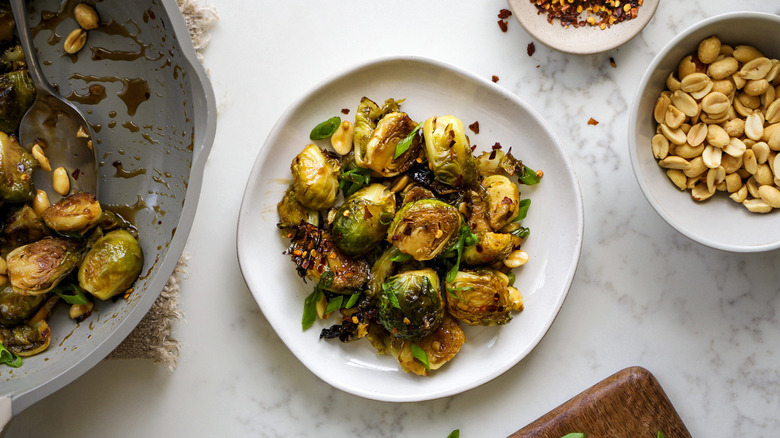
- 24 ounces Brussels sprouts, ends trimmed and halved lengthwise
- 2 tablespoons olive oil
- 4 tablespoons soy sauce
- 2 tablespoons Chinkiang vinegar (Chinese black vinegar)
- 1 tablespoon Shaoxing wine (Chinese cooking wine)
- 4 teaspoons toasted sesame oil, divided
- 3 tablespoons light brown sugar
- 2 teaspoons cornstarch
- 2 cloves garlic, minced
- 1 teaspoon grated ginger
- ½ teaspoon red chili flakes
- Kosher salt, to taste
- Fresh cracked black pepper, to taste
- ⅓ cup roasted peanuts
- 2 green onions, sliced
- Preheat the oven to 400 F. Line a baking sheet with parchment paper.
- Place the Brussels sprouts onto the baking sheet and drizzle them with olive oil.
- Roast in the oven for 20 minutes, flipping the Brussels sprouts half way through cooking time.
- In a bowl, whisk together the soy sauce, Chinkiang vinegar, Shaoxing wine, 1 teaspoon sesame oil, brown sugar, and cornstarch. Set aside.
- Heat the remaining 3 teaspoons of sesame oil in a skillet over medium heat.
- Add the garlic, ginger, and chili flakes and saute for 2 minutes.
- Add the roasted Brussels sprouts and stir-fry until coated. Reduce the heat to medium/low.
- Pour the sauce over the Brussels sprouts and simmer for 2-3 minutes, or until the sauce is slightly thickened, stirring occasionally. Season with salt and pepper to taste.
- Remove the sprouts from the heat. Stir in the roasted peanuts and garnish with green onions before serving.
| Calories per Serving | 293 |
| Total Fat | 17.9 g |
| Saturated Fat | 2.5 g |
| Trans Fat | 0.0 g |
| Cholesterol | 0.0 mg |
| Total Carbohydrates | 27.6 g |
| Dietary Fiber | 8.1 g |
| Total Sugars | 11.2 g |
| Sodium | 927.2 mg |
| Protein | 10.5 g |
